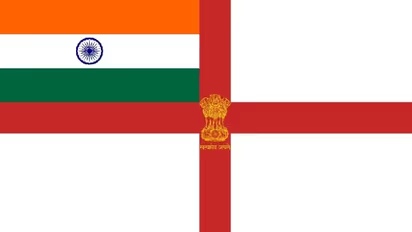Indian Navy to get new ensign; PM Modi says move aimed at doing away with colonial past

Synopsis
Prime Minister Narendra Modi will unveil the new ensign of the Indian Navy during the commissioning of the country's first indigenously-built aircraft carrier -- INS Vikrant on September 2.
In a landmark move aimed at shedding India's colonial history, Prime Minister Narendra Modi will unveil the Indian Navy's new ensign during the commissioning of the nation's first indigenously-built aircraft carrier -- INS Vikrant, on September 2.
According to a statement from the PMO, the Prime Minister will commission INS Vikrant at Cochin Shipyard Limited and will also 'unveil the new Naval Ensign (Nishaan), doing away with the colonial past' at the event. The statement added that the Indian Navy's new ensign would be 'befitting the rich Indian maritime heritage'.
The current ensign of the Indian Navy carries the Saint George's Cross with the Tricolour in the canton (top left corner of the flag), and the Emblem of India emblazoned at the intersection of the horizontal and vertical red stripes.
Indian Navy's ensign to get 4th change since 1950
The Indian Navy draws its origin in the colonial period. On October 2, 1934, the naval service was renamed Royal Indian Navy (RIN), with its headquarters at Bombay (now Mumbai), according to information shared on a website of the Indian Navy.
With the partition of India, post-independence, the Royal Indian Navy was divided into the Royal Indian Navy and the Royal Pakistan Navy. The Indian defence forces continued to use the British colonial flags and emblems after Independence on August 15, 1947.
With India becoming a Republic on January 26, 1950, the prefix 'Royal' was dropped, and it was rechristened as the Indian Navy. At that time, the only modification made to the Navy crest and flag was the substitution of the Tricolor for the Union Jack while keeping the Saint George's Cross.
The navy ensign underwent a change in 2001 when the Tricolour was kept in the upper left corner, and the naval crest took the place of the Saint George's Cross in the middle of the white flag.
In 2004, the red Saint George's Cross was back with the addition of the Ashoka emblem at the Cross' intersection. The Naval crest was dropped.
In 2014, the national motto "Satyameva Jayate" was added under the Ashok Emblem. The one adopted in 2014 is the current ensign of the Navy. The new ensign's design has not yet been made available to the public.
INS Vikrant's commissioning a 'significant step towards self-reliance in defence sector'
Meanwhile, ahead of the INS Vikrant's commissioning, Vice Chief of Indian Navy Vice Admiral SN Ghormade stated that the warship, built at a cost of Rs 20,000 crore, would contribute to ensuring peace and stability in the Indo-Pacific and Indian Ocean region.
The PMO, in its statement, said the Prime Minister had been a "strong proponent of 'Aatmanirbharta', especially in strategic sectors.
"In what will mark a significant step towards self-reliance in the defence sector, Prime Minister will commission the first indigenously designed and built aircraft carrier as INS Vikrant," it added.
The largest ship ever constructed in India's nautical history, Vikrant was designed by the Navy's internal Warship Design Bureau (WDB) and built by Cochin Shipyard Limited, a public sector shipyard under the Union Ministry of Ports, Shipping & Waterways.
The indigenous aircraft carrier is named after her illustrious predecessor, India's first aircraft carrier, which had played a vital role in the 1971 war.
It has a large number of indigenous equipment and machinery, involving major industrial houses in the country and over 100 MSMEs.
The statement said that with the commissioning of Vikrant, India would have two operational aircraft carriers, bolstering the nation's maritime security.
(With inputs from PTI)
Stay updated with the Breaking News Today and Latest News from across India and around the world. Get real-time updates, in-depth analysis, and comprehensive coverage of India News, World News, Indian Defence News, Kerala News, and Karnataka News. From politics to current affairs, follow every major story as it unfolds. Download the Asianet News Official App to stay informed anytime, anywhere.